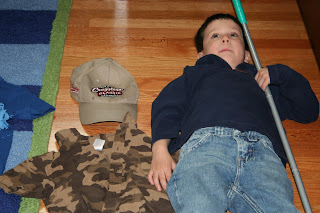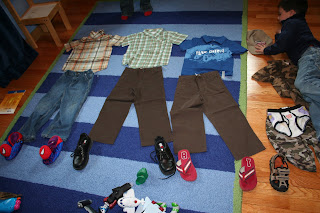Bottom line - our passion is to instruct our children in handling their finances wisely. I've been giving it much thought over the past few years, researching basic foundational principles and have come up with a system to teach them about finances that I feel is easy for them to grasp. And I'm talking about age 3 on here. We desire that our children learn early on solid work ethic through chores and also understanding the wait that comes in saving up for a special toy when the world they live in is all about instant gratification.
So here's the system that we've come up with...
Every week we print out a new 'chore' chart. Now the graphic designer that lives here hasn't got too fancy with the chart yet so we're waiting on that to come but it's a basic chart with a section for both of the boys. Josiah has 5 chores and Noah has 3 chores (I went with those #'s based on age). They are age appropriate chores as well - for example Josiah has to help unload the silverware from the dishwasher, but not the plates. Noah has to empty all the laundry down the laundry chute whereas Josiah has to match socks and put those away once the laundry is done. They BOTH are responsible for setting and clearing the table and have done great with that! And a few other things on there too (see charts below).
On a daily basis then (m-f), we have a time of reviewing the chart to see what chores they did that day and they each get to choose a sticker or # of stickers to put on the chart for the chores that they completed. At the end of the week (pay day around here is Friday!), we count up how many stickers they each got. Right now the pay scale is .10 per chore (so if anyone else wants to work for that wage around here, we'd be happy to hire you!!). The boys don't know money differences too well and they are so proud to have earned money through their work - I believe even little children gain such a satisfaction out of completing a simple chore.
So after counting out our change, we sit down with 3 envelopes each (which they had much fun decorating in the beg although our current envelopes are in need of replacement by now);
1) Tithe
2) Savings
3) Spending
And in that order, we start to administrate their earnings between the 3 envelopes. Every week and week after week, our first question is always and will always be - 'Who do we give to FIRST boys?'. They loudly shout in response back to us - 'GOD!'. We want the principle of tithing to be so ingrained in their hearts and heads that it's a no brainer for them later in life - they would have been trained from such a young age that the 1st of their earnings ALWAYS goes right to God. Now they don't understand 10% at this point, but they are learning that a portion of their earnings goes to God and that's enough for now at this age. Whatever amount is left after that we count out and have them put about 40% to savings (that is always 2nd) and the balance to spending. We've instructed them this way with the savings envelope - the basic principle is to put money away and save up for very special things. The key here is that we put it away and we DON'T spend it. And then finally the beloved Spending envelope. Many a happy trips taken to stores with this one, although not much that you can spend with .40 allowance a week! :) Dollar stores are great.
All envelopes go right back to us to be stored away and the next exciting weekly occurrence that puts some of the pieces together for them is actually getting to participate in giving their tithe every Sunday. They look for their envelope in my purse now and know a loss if we 'forgot' it. Once the tithe comes around, they have the satisfaction of giving of their own earnings and this is again something that I believe they are not going to easily forget. As young children they can participate in the life of the church at this level.
One great learning experience with Josiah - he had been wanting to get a pair of baseball gloves for awhile. They were $10 at Target so we finally had enough money between his chores and other gifts given him (with the combined savings & spending envelopes) to go to Target and buy his gloves. I would highly recommend that you count out the money with your child before you get to the store because there is a level of disappointment in them once they see that their envelopes are completely empty. And/or purchase the item ahead of time, show them the price and count out the money together at home for it. Josiah had a tough time with this purchase because he instantly realized that the money was GONE and that he wasn't going to be able to buy anything else from his wish list anytime soon - but really this is where this experience is going to help him later in life, he needs to understand that when you part with hard earned cash, it is indeed gone, and you have to work hard again to replace it (and make sure what you spent it on was really worth it and not a whim! but we parents can help them not make those mistakes early on...).
SO all that said, the system has been working wonderfully for us and I really feel as if the boys are grasping beg foundations of working with finances. I have of course big, big plans of how to expand this in the future with them as they get older and won't bore you with all those ideas right now, but I do believe I'll be a big promoter with all of the children, esp through the high school years, of a simple envelope system for managing their money.
 Our Official Building Permit! :)
Our Official Building Permit! :)








Lot+26.JPG)











































